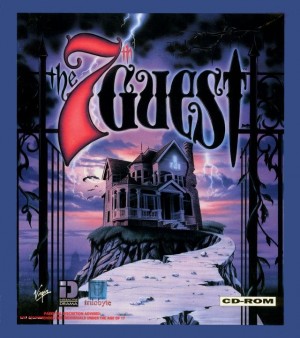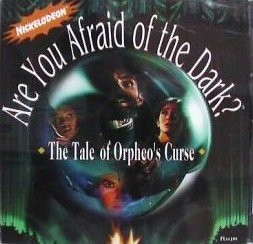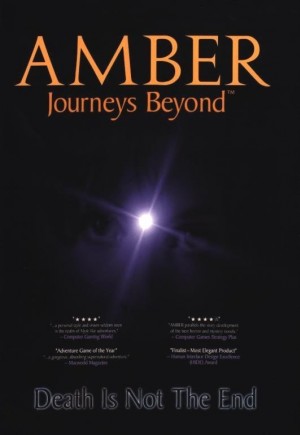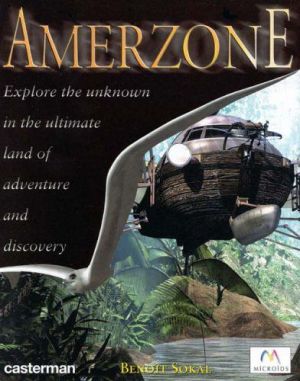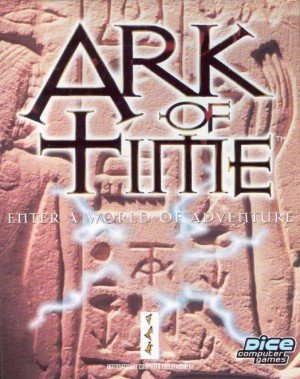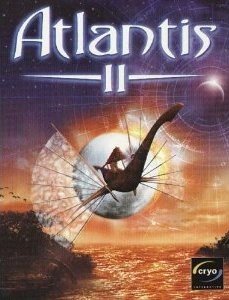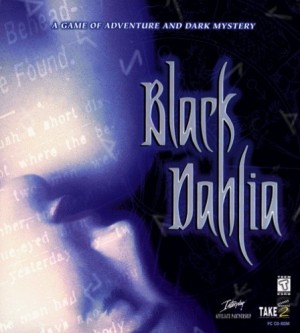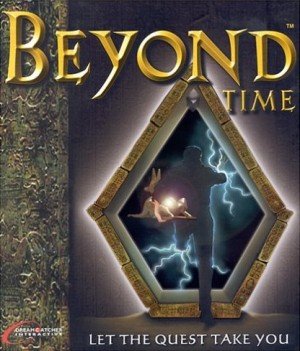Macintosh adventures
New Perspectives -- Adventures in Macintosh Shareware
As people age, they have a tendency to generalize their nostalgia, especially as the history of adventure games goes. It is all too easy to think of the development of the modern adventure solely in terms of the rise of the early giants, Sierra and LucasArts. But for a brief period during the first half of the 90’s, the atmosphere was quite different than many of us may remember. This was the Golden Age of shareware, when the pay-to-register business model rewarded independent developers without the worldwide threat of piracy and the Macintosh operating system won over hearts and minds from the DOS-based Windows 3.1 camp. In many respects, the Macintosh System 7 of the early 90’s had it all: crisp graphics, an easy-to-use interface and most importantly (for the purpose of this article, anyways), talented independent developers working on adventure games. The intent of this article is to introduce some of these brilliant Macintosh-only adventures of yesteryear so that they can be experienced by a greater audience today.
Disclaimers, disclaimers, disclaimers
Please remember that this is not a treatise or even a historical account of Macintosh adventures. It’s not my prerogative to definitively review these games, either. I doubt I could be completely objective after growing up as a Macintosh gamer. With the death knell of adventure games on the PC being sounded all too often, think of this article both as an eye-opener for some, and a walk down memory lane for others. After all, an adventure is an adventure, no matter what computer it’s running on. We’re all here because we love the adventure genre--why not break through the shackles of OS evangelism at the same time?
But I don’t have a Mac, gosh darnit!
Fortunately for the world of PC computing, 68k Macintosh emulation has reached the point where it is not only technically feasible, but legal as well. There are many excellent emulators out there, my personal favorite being the cross-platform Basilisk II. With the free distributable version of Mac OS System 7.5.3 available on Apple’s website, the only thing preventing your average PC gamer from playing any of any of the following adventures is the necessity of a Macintosh ROM image. These can be extracted from an old Macintosh (eBay is a good bet) or located with some detective work on several internet websites. You will also need to set up a virtual drive to be emulated. Several tutorials are available on the Win32 Basilisk II site that can make the process as painless as possible.
If setting up Basilisk II or finding a ROM image sounds daunting, there are other cost-effective options available. Commercial emulators such as SoftMac or Executor are able to run any of these games as well.
Clearly, the benefit of time is a boon for gamers looking to dip their hands into other operating systems. Thanks to the wonder of modern emulation, you don’t need to mess with difficult Macintosh hardware, purchase a separate operating system or even pay shareware fees to get your hands on these acclaimed Macintosh games. So, without further ado, I now present the first of six fantastic Mac-only adventures, divided by designer:
Cliff Johnson and the “computer metapuzzle”
Cliff Johnson is a huge name in the puzzle business, having recently gained notoriety for designing the $100,000 treasure hunt for David Blaine’s book, Mysterious Stranger. Before going on to consult for Disney Online and Interplay, Johnson created several brilliant standalone adventures for the Macintosh, designed around the concept known as the “metapuzzle.” In an interview in 2003, Johnson explains this term: “It’s a collection of puzzles that, when solved, each give a piece of a master puzzle.” This was not a new concept at the time, but its application to computers and adventure games was incredibly progressive in 1987. The philosophy contributed to Cliff Johnson’s first game, The Fool’s Errand, which is arguably the first known computer game based upon a metapuzzle. The game was a massive success. Johnson refers to college students and other adults coming up to him at conventions and telling him “I hate you,” because his game devoured so much of their time. Although The Fool’s Errand was more of a puzzle game than a traditional adventure title, it did have a plot, one of an ancient Sun Map that would restore peace to four medieval kingdoms.
The Fools Errand’s success would lead Johnson into publishing 3 in Three, an entirely new game with an improved storyline. The protagonist is “3,” a number that busts out of a computer spreadsheet and into the wilderness of the computer mainframe. 3’s attempts to return to his rightful place in the spreadsheet characterize the majority of the plot, which is divided by a wide variety of word and number puzzles.
 |
 |
 |
Both 3 in Three and The Fool’s Errand are excruciatingly linear games, but calling them strictly puzzle games because of this would be an oversimplification. The games are filled with communicative interludes (what we would probably refer to today as cutscenes) where characters interact or plot elements are provided. In my personal opinion, these scenes more resemble a traditional adventure than a puzzle game. You don’t play through a Cliff Johnson game for a temporary distraction during your coffee break. The puzzles are the focus, not the dressing, and your reward for solving them is usually an entertaining bit of narrative that fills out the game’s story.
Don’t get me wrong, though--if you are looking for the next Macbeth or The Iceman Cometh in any of Cliff Johnson’s games, you’ve picked the wrong Macintosh adventure. But if you appreciate quality puzzle design and a quirky narrative, give The Fool’s Errand or 3 in Three a try. You won’t regret it.
Cliff Johnson’s games are available for the Macintosh, free of charge, at his website.
Ray Dunakin and the World Builder experience
World Builder was a Macintosh game design suite that was quite popular in the early 90’s. Though the engine is now discontinued, it gave birth to a series of excellent shareware adventure games. Ray Dunakin is the designer responsible for three first-person adventure games using the World Builder engine: A Mess O’ Trouble, Another Fine Mess, and Twisted!. Unlike Cliff Johnson and his metapuzzle adventures, Dunakin’s games are more reminiscent of first-person adventures we’ve seen for the PC. But with such incredibly crazy worlds, a distinctive artistic style, and oodles of inventory management, Ray Dunakin’s shareware masterpieces separate themselves from the pack. They are still beloved by much of the Macintosh gaming community today.
Twisted! in particular stands out as a highlight of the three games. While A Mess O’ Trouble and Another Fine Mess are strictly black-on-white endeavors, Twisted! was re-released in full-screen color in 1999 as Twisted! Deluxe. The narrative is both entertaining and hilarious: you are a tornado chaser transported into the land of Ooz during a particularly nasty experiment. The world parodies that of The Wizard of Oz with a twist: the game was released during the 1996 United States presidential election. Jabs at Bill Clinton, Colin Powell, and George Bush Sr. are included to great effect. Though the political satire somewhat dates the game, Twisted! remains astoundingly fresh. The clean hand-drawn visuals look similar to those of such PC titles as Dare to Dream, though Dunakin’s artistic merit and frenetic worlds set his games apart..
 |
 |
 |
From A Mess O’ Trouble to Twisted!, Ray Dunakin almost single-handedly popularized the World Builder development suite with his successful trio of first-person adventures over the course of the 90’s. If you enjoy unique worlds and don’t mind emphatic satire, these titles are worth any gamer’s salt.
Dunakin’s games are freely available at his website.
Andrew Plotkin’s System’s Twilight
Every great puzzle in a game has an even greater mastermind behind it, and System’s Twilight is no exception. Its designer, Andrew Plotkin is a worshipped figure in the Interactive Fiction (IF) community, with impressive works as Spider and Web and Shade. Lesser-known (unfortunately) was Plotkin's 1995 venture into adventure games, an endearing puzzle-adventure called System’s Twilight.
System’s Twilight is a standalone Macintosh adventure that unites the computer metapuzzles of Cliff Johnson fame with an entertaining nonlinear storyline. Chock-full of unique puzzles, the game follows the story of a neophyte piece of data in an abstract computer world where programs are characters to be conversed with. While System’s Twilight is hereditary of Cliff Johnson’s metapuzzle adventures, it brings to the table some much-needed nonlinearity as well as a stronger narrative.
 |
 |
 |
The graphics in System’s Twilight are simple bits of 2D shapes and polygons, but the puzzles and gameplay more than make up for the lack of visuals. The game synthesizes abstract puzzle-solving into an adventure game to great effect, and none of the puzzles ever feel hackneyed or forced. Plotkin notes on his website that “as far as I know, all twelve kinds of puzzles are original.” Finishing System’s Twilight is a rewarding experience in terms of both adventuring and puzzle-solving. Chances are, you haven’t played anything like it before.
For those who find the metapuzzles of Johnson too difficult or the zany worlds of Ray Dunakin too overwhelming, Twilight is a great game that combines both extremes. Plus, System’s Twilight is no longer shareware and is free for all to download at Plotkin’s website.
An Apple a day…
If you have been acclimatized to PC adventures for far too long, think about venturing outside of the box into the world of Macintosh shareware. These games by Cliff Johnson, Ray Dunakin, and Andrew Plotkin are all hidden gems. While easy to overlook because of their original platform, these games are all well-thought, cohesive adventures, filled with a vast array of original puzzles and worlds to explore. I heartily recommend them to any adventure gamer regardless of his or her favorite operating system.



